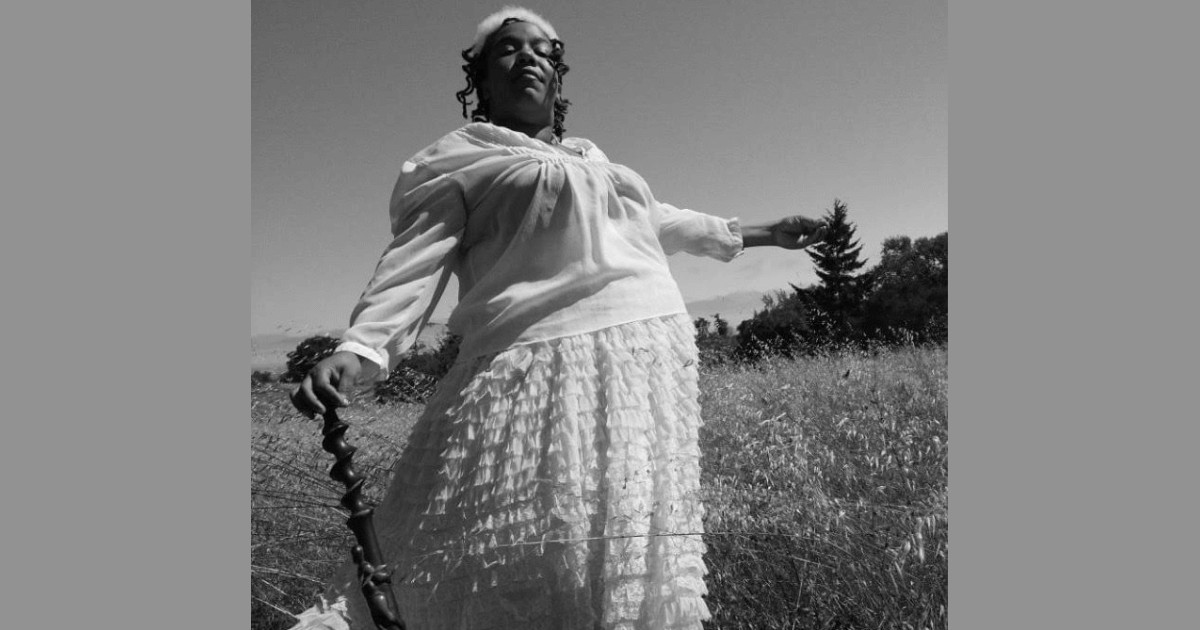Queen Jasmeen: Creating Space for Disability Through Poetry
“Poetry was the first way I asked for help.”
–Jasmine “Queen Jasmeen” Schlafke
Slam poet and disability justice advocate Jasmine Schlafke began writing at age twelve and began competing in slam poetry in 2011, where starting in 2012 she won the Santa Cruz Grand Slam Championship three years in a row, and was the Grand Slam champion of San Jose in 2014. Her stage name, Queen Jasmeen, declares her identity as an Afro-Latinx, queer, disabled single mother, to be royalty as an act of revolution. As slam master for Santa Cruz CA Legendary Collective, she embodies how slam was created as an accessible art form. An article on the art explains“Slam provides access to poetry for those who believe poems are impenetrable.” Slam makes the stage the perfect place to confront gatekeeping, both that of the outside world and internalized oppression.
“There is an internal silence when it comes to mental health. Through poetry I’m able to express what a manic episode…feels like. I believe art can translate what can’t be said with words.”
Schlafke’s work is a lifeline for those with mental illness. It’s often a way to be seen for many who are so regularly invisibilized and silenced. She writes, as she says, “for people of color, teen moms, queer folks and the mentally ill. I guess in that sense I write for my own intersections.”
On explaining being bipolar to her mother:
“For those of us forced to share our most beautiful features
under glass,
imagined ourselves museum exhibits grateful for the patrons
even while they wear us down,
for synapse-delayed reactors
with wide vision and big feelings,
when someone asks you what it feels like to be bipolar
make sure they have room enough for your answer.”
Many finally hear themselves in her honest descriptions of navigating mental illness. One of her students describes feeling seen by Schlafke’s poetry: “I haven’t yet found the exact string of words to describe the lightening bolt of awe, heartache and soothing that simultaneously pinned me to my chair. You’d think after hearing her perform hundreds of times over the years of our friendship that I would have gotten used to the way the room quells into burning silence as soon as she approaches a microphone, yet the magic of her words feels new every time.”
No matter where they are in their healing, for them Schlafke’s poetry is celebration, lament, eulogy, and compass often in the same poem. She speaks to the profoundly felt alienation of depression; she speaks to those still deciphering their relationship with themselves.
“I have been told that people walk away from my poetry feeling more capable of asking for help and speaking up. Many folks begin dialogue about their own mental health, particularly to their partners. My daughter says my poetry is about ‘the struggle, black people and pussy’ and so hopefully people walk away with a deeper understanding of all three.
Living in our society with mental illness is to walk a fault line between ableism and disability justice. It is to exist in direct defiance of a world that tells us to apologize for doing so. We are taught to be ashamed of our divergence from the norms of ‘capable-bodied’ ness; often pride in our neurodiversity is galaxies from our initial realities. Unlearning the stigma so often internalized is a lifelong process.
Whether performed or from the pages of her poetry book, Crowned, Schlafke’s work creates space for the isolated, silenced and community-less. Her writing is a figurative and literal love letter to “the Kingdom built of village.” Her usage of royalty as it is rooted in black radical feminism rewrites an exclusive concept into one where Jasmine centers the vulnerable.
By fundamentally challenging all the systems that marginalize her intersections, Schlafke makes space for her narratives, and for the marginalized voices following her.
In “Short Poem on Queendom,” she writes to herself: “Yes, affirm your queendom,/ Beloved, with the vigor you hope your kin will for themselves/and live in the Kingdom built of village.”
The first thing you notice about Schlafke is her smile, a crown of love and joy. She shares that she’s celebrating “my children: them becoming adults. I’m inspired by getting to know them more every day.” Everywhere she goes she builds community. She fundamentally believes in the wisdom and magic of children, especially those so heavily silenced such as those struggling with mental illness. Many of her students struggle with mental illness, and many are disabled; she amplifies and uplifts their voices and stories as a coach, friend, and community member.
Unlike in many other art forms where youth is an obstacle to being heard, slam emphasizes young people’s voices. She says, “I live for young people. Teenagers are my favorite people for sure. They often inspire my art.” Many adult artists began their careers as youth. It’s incredibly common for them to have begun in poetry workshops at their schools run by groups like Bay Area Creative–an arts organization run by local Bay Area poets– for whom Jasmine has taught her craft. Jasmine grew up in the New Conservatory Theater in San Francisco surrounded by “a family…of theater.” When I ask her about her dreams for her community she shares that if she could do anything, she would help fund artists to teach and write.
She says, “I’d love to see my community able to both create change and be self supporting.” Everywhere she goes she brings this healing light in her smile, her poetry, her truths. By celebrating herself and not hiding her struggles, she offers support to disabled folks who are told repeatedly we should be invisible. She inspires both old and new community to defy the urge to fade, by living loudly instead.
Jasmine has long stood for the rights of youth with disabilities. A beacon in a world where it is so easy to be lost beneath the tides of ableism. Too many youth struggle to keep their heads above water in a very broken world. So many of us find ourselves counting our inhales on one hand; we get the occasional moments of joy, or access to care, or support when we’re so damn exhausted. But so much of the time is spent keeping our mouths above the waves only to be gaslit, and told that the water is still and if we tried harder, we could float just fine. And yet, at the same time those same people create larger and larger wakes, continuously depriving us of safe passage to shore. Disabled folks have long learned that we can only depend on each other; only we will invest the time in teaching each other how to swim, both in the calm and the stormy.
There can be no healing without community care. Jasmine embodies community for so many youth navigating mental illness.
About Rooted In Rights
Rooted in Rights exists to amplify the perspectives of the disability community. Blog posts and storyteller videos that we publish and content we re-share on social media do not necessarily reflect the opinions or values of Rooted in Rights nor indicate an endorsement of a program or service by Rooted in Rights. We respect and aim to reflect the diversity of opinions and experiences of the disability community. Rooted in Rights seeks to highlight discussions, not direct them. Learn more about Rooted In Rights



